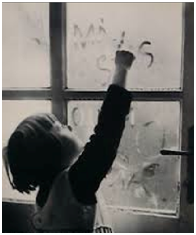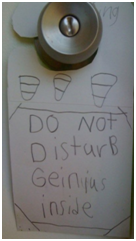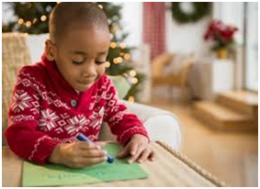30 Ways to Help Your Child with Spelling[Part 2]
Essential, research based, Do's and Don'ts for parents of young writers and spellers (continued)
by Geneva Walker

For Spellers Often Spelling All Sounds in Words (around age 5-7):
Do: Continue the above tips.
Don't: forget that you will continue to see inventive spelling: (house= hows, transition = chranzishun,)
Do: remember that your child will start to correctly spell certain high frequency words they see regularly (the, of, off, see, out etc.).
Do: read aloud to your child poetry, fiction, non-fiction. Inspire them to write by enticing them with ideas and fun content.
Do: spell a word for your child sometimes if they ask.
Don't: forget to model writing in grocery lists, notes, texts, letters - talk out loud about what you are thinking as you write and are spelling words.
Don't: expect your first grader to spell like an adult.
Do: ask your child to say a word slowly, listening for each sound in order. For words that are longer (two or more syllables), teach them how to find syllables by putting their hand under their chin and feeling when their mouth opens and closes. Encourage them to write each syllable one at a time for longer words like ba na na.
Don't: try to read your child's writing if you cannot. Ask them if they want to read it to you. Sometimes they cannot. That's ok.
Do: Let them know when they spelled a word that you could read!
Don't: forget to provide them with paper, pens, pencils, crayons, fun smelling markers… anything so they can write whenever they are inspired.
For Spellers Moving Beyond Phonetic Spelling Towards Some Sight Words (around age 6-8):

Don't: forget to encourage them and notice their accomplishments. Noticing unique adjectives, clever humor, similes, metaphors, or a fun plot is a great way to support them.
Do: insist casually and matter-of-factly that all known words be spelled correctly. "You know how to spell the word "of" I think. Can you remember?
Don't: forget to try encouraging your child to clap out syllables and then spell each part.
Do: use an individual spelling dictionary at home. You can use a mini address book and place words they want/need in their dictionary. Sight words (once, of, was) can be written on both the correct page, AND the page where your child thinks it would be ("once" on page w, "of" on page u)
Do: Say "Look how close you were! I'll help you find it. See how it looks? Does it look right to you? You spelled "mak", do you remember what letter makes the "a" say it's name? That's right! The silent e".
Don't: hesitate to ask your child's teacher what his/her systematic spelling program looks like.
Do: remember your child will still spell some words phonetically.
For Older Children Doing Word Study and Getting Help (around age 7-12):
Do: help make spelling consciousness a habit by encouragement and asking them to circle words they think they aren't sure about. They can select one or two to correct using their spelling dictionary or a regular dictionary.

Do: remember struggling spellers can feel self-conscious. Research discourages telling children they are not good spellers; however, showing them how they are improving will motivate them.
Don't: forget to encourage your child to use parts of known words to spell unknown words. (if you can spell "light", you can spell "enlighten").
Do: ask your child to reread for spelling after they have written and reread for content.
Congratulations! Not only have you made it to the end of the article, but you likely have your child enrolled in a Montessori school, or are looking into it.
Am I biased? Yes. I have been working with children for over 15 years in public and private schools, and my 8 years as a Montessori teacher have been the most rewarding. Our goal is to take research-based pedagogy and deliver it individually to each child at his/her unique developmental level. Individualized education folks. Does this mean your child will be winning spelling bees in no time? Possibly. They will, however, be pushed to achieve their best at each developmental level without the boredom of group tests nor the struggle of feeling behind.

If you're interested in reading more research based articles about spelling, here are a few I recommend:
